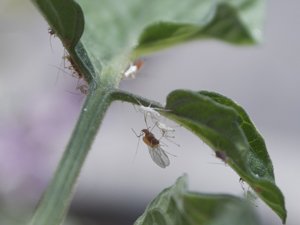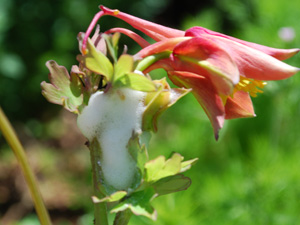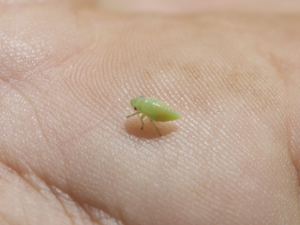Other Tomato Pests
Insect tomato pests include the infamous tomato hornworm, as well as aphids, leaf hoppers, and whiteflies. Root-knot nematodes are a common non-insect pest.

|
|
Transmit Diseases © Steve Masley (Click IMAGE to Enlarge) |
Some of these pests do little damage on their own, but can transmit viruses from other infected plants, or the physical damage caused by their feeding becomes an infection site for bacterial or fungal diseases to attack your tomatoes.
Aphids are often a problem when growing tomatoes. Aphids suck juices from the leaves, depriving the plant of sugars that would otherwise sweeten your tomatoes. They also exude a sugary substance to attract ants to protect them, and molds and pathological fungi take hold in this and can attack the plant.
Interplant basil to repel them, or plant nasturtiums as a trap crop for aphids. Remove and compost the nasturtiums once they’re infested with aphids. Soap sprays can be used to knock back severe infestations.
You can also attract beneficial insects that attack aphids, like ladybugs, lacewings, soldier beetles, and syphid flies.

|

|
|
can Transmit Western Yellows Virus © Steve Masley (Click IMAGE to Enlarge) |
Beet Leaf Hoppers can be a problem on tomatoes, especially for western gardeners growing tomatoes where spinach, beets, or Swiss chard have been grown.
In the west, leaf hoppers transmit Western Yellows, a virus that stunts plants and stops new fruit production.
Where this is a problem, avoid planting tomatoes in close proximity to beets, spinach, or Swiss chard. Control weeds near tomatoes in early spring.
If you see foamy blobs on the stems or leaves of plants near the tomato patch, pick them off and drop them into soapy water, or put them in a closed plastic bag in the sun. They contain spittle-bugs, the nymphs of leafhoppers.
Whiteflies can sometimes be a major tomato pest, especially in greenhouses. Outdoors, they’re more likely to be a problem in overcrowded or shady plantings, where foliage stays wet a long time.
Whiteflies can also arise from over-fertilization, which promotes excessive tender new leafy growth.
If you have frequent whitefly problems, open up the spacing between plants when you plant your tomatoes to improve air circulation. Soap sprays can be used to knock back infestations.
Root-Knot Nematodes are microscopic soil worms that burrow into roots, stunting the plants. Where nematodes are a problem, interplant dwarf marigolds with the tomatoes, or plant tomatoes in beds where marigolds have been grown. Marigolds secrete root exudates that repel nematodes.
In long-summer areas where soil temperatures stay warm for a long time, use shrimp or crab meal as a nitrogen source when growing tomatoes.
These soil amendments contain high levels of chitin. It takes several weeks for populations of chitin-eating bacteria to build up in the soil, but once they do, they soon exhaust the chitin from the soil amendments. Then they go to work cracking the next highest source of chitin available—soil nematodes.
Top of Tomato Pests page
|
Tomato Hornworm
Growing Tomatoes
Copyright © 2009-2025, by Steve Masley, Grow-it-Organically.com
All rights reserved
HOME | About Us | Contact Us | Privacy
New! Comments
Have a question or comment about what you just read? Leave me a comment in the box below.